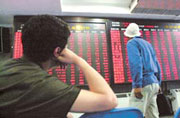 |
| Gov't sets up stock protection reserve |
China has announced that a stock investors' protection fund came into operation yesterday, after three months of preparation work.
The news cheered up the market, with the Shanghai Composite Index surging 2.1 per cent to settle at 1155.48 points on turnover of 14.4 billion yuan (US$1.8 billion) in Shanghai and Shenzhen.
A company was established to take care of money in the new fund, which aims to protect securities investors by offering them compensation in case of a brokerage bankruptcy, closedown or regulatory takeover, according to market watchdog China Securities Regulatory Commission (CSRC).
The fund is solely State-owned and its money will came from six sources: stock trading commissions from the Shanghai and Shenzhen stock exchanges; the brokerages; interest generated from subscriptions to share and bond issues; liquidated assets from failed securities houses; donations and other legal sources.
CSRC did not reveal the size of the fund, but late in June the central bank said it had offered 10 billion yuan (US$1.2 billion) to the fund.
Meanwhile, the annual interest from the subscription fee was estimated to be some 300 million yuan (US$36.2 million).
When a securities broker goes bankrupt or is taken over due to irregularities, the fund will compensate traders.
After handing out compensation, the fund company will participate in the liquidation of the failed companies as a creditor.
"This makes it efficient for us to compensate investors, in particular small investors, and will minimize market unrest due to the bankruptcy of a brokerage," a spokesman for the fund company said.
The fund is a vital tool, among others, to keep a stable stock market, said Dong Chen, a senior analyst at CITIC Jianyin Securities.
As a financial institution, securities houses are very special because their failure or bankruptcy can cause great losses to investors and thus create serious market panic. The unrest on the securities market often spreads to other financial sectors due to their close relation, and might lead to social instability, which is what the government is concerned about most of all, the analyst said.
Before the introduction of the fund, the government had to bail out a failed brokerage because of the possible serious consequences, and also because almost all of China's securities brokers were State-owned.
For example, when Southern Securities fell into financial trouble and was taken over by the government at the start of last year, the central bank had to lend it 8 billion yuan (US$967.4 million) in case its investors rushed to withdraw their guaranteed funds.
When Xinhua Securities was closed down in December 2003, the central bank lent it 1.5 billion yuan (US$181.4 million).
But investors should not depend on the fund to help them in all cases, said Yi Qing, a veteran trader in Beijing.
The fund will not cover losses due to traders' poor trading decisions and normal market risks, according to a circular concerning the protection fund issued in late June by key State departments.
"Investors should be selective and choose credible brokers," Yi said. China has 70 million securities investors.
The regulator also said the fund would be operated in a conservative way in order to keep its money safe. It will be allowed to invest only in bank deposits and bonds from the State, central bank and other high-level financial corporations.
China's brokerage sector has been in great difficulties over the past four years due to the sluggish market and many legal loopholes.
In 2004 alone, 13 brokerages were punished by CSRC due to their irregularities. And so far about 20 securities companies, including former market heavyweight China Southern Securities, have been closed down or taken over because of embezzlement of clients' guaranteed funds.
(China Daily)
|
